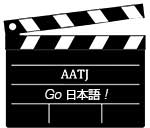

by Amanda Rollins, Japanese Language Program Coordinator
Japanese Language Education Update #10: Three pieces of good news for JLE
 This month’s JLE Update comes to you in three parts: an award-winning teacher, an advocacy video project, and a free advanced online Japanese textbook.
This month’s JLE Update comes to you in three parts: an award-winning teacher, an advocacy video project, and a free advanced online Japanese textbook.
This year, the U.S.-Japan Foundation chose to honor Tomokazu Morikawa with the 2014 Elgin Heinz Teacher Award (Japanese Language Category), given annually to a pre-college Japanese language teacher who significantly contributes to mutual understanding between Japan and America. Morikawa-sensei stands out as a teacher who develops projects which get his students out of the classroom and into the real world. He has set up several sister-school relationships, summer trips to Japan, and project-based lessons which ask students to make walking tours for Japanese tourists in San Francisco. He is also a dedicated advocate of professional development by being active in teachers associations and moderating the online Japanese Language and Culture AP Exam teacher community. Congratulations to Morikawa-sensei!
 The American Association of Teachers of Japanese (AATJ) has a launched a new advocacy video project, and they are calling for video and photographs from your school’s fun Japan-related events. They are especially interested in short videos of excited students explaining why they are studying Japanese. The final product will spread far and wide, so let’s make sure they have the best possible materials! Please submit photos and clips by February 1, 2015.
The American Association of Teachers of Japanese (AATJ) has a launched a new advocacy video project, and they are calling for video and photographs from your school’s fun Japan-related events. They are especially interested in short videos of excited students explaining why they are studying Japanese. The final product will spread far and wide, so let’s make sure they have the best possible materials! Please submit photos and clips by February 1, 2015.
Teachers of advanced Japanese classes will be interested to know that there is free textbook available online in PDF form at this website. Monty’s Bridge to Tomorrow was written and edited by a team of dedicated Japanese language educators to commemorate Montgomery Dickson, who sadly perished in the Great East Japan Earthquake and Tsunami on March 11, 2011. The textbook covers difficult topics like natural disasters and the importance of community using links to Youtube videos and informational websites, and each chapter also features a teachers’ guide. It was made possible by a grant from the Japan Foundation Center for Global Partnership.
This month’s Advocacy Tip: Do you maintain contact with any of your former students? If any of them have visited Japan, you might consider inviting them to your classroom or Open House to make a presentation on their experience. PowerPoint presentations with photographs always make an impression, especially when it makes people think, “If she went to Japan, maybe I could too!”